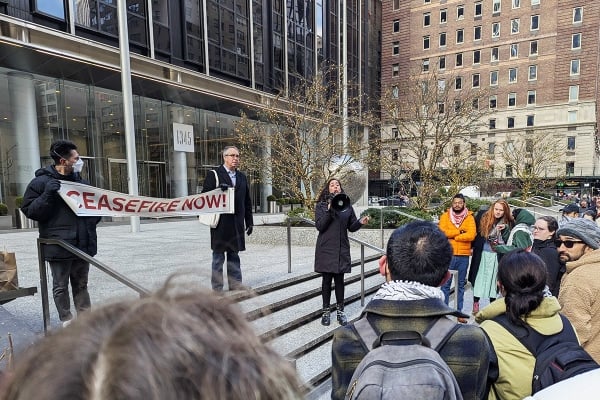The American Historical Association’s top elected body has shot down a resolution opposing scholasticide in Gaza, after members who attended its annual convention approved the statement early this month by a 428-to-88 margin.
The association’s elected council, which has 16 voting members, could have accepted the resolution or sent it to the organization’s roughly 10,450 members for a vote. Instead, the council rejected it as the official position of the association.
Jim Grossman, the association’s executive director and a nonvoting member of the council, said the Thursday afternoon vote was 11 to 4, with one abstention. He said the meeting was over Zoom.
The rejected resolution had condemned the U.S. government’s funding of Israel, saying it “has supplied Israel with the weapons being used to commit this scholasticide” and that Israel “has effectively obliterated Gaza’s education system.” Scholasticide is defined as the intentional eradication of an education system.
The resolution also called for a permanent ceasefire and for the association to form a committee to help rebuild Gaza’s “educational infrastructure.”
In a written explanation of the veto, the council said it “deplores any intentional destruction of Palestinian educational institutions, libraries, universities and archives in Gaza.”
However, it considers the resolution to be a contravention of AHA’s “constitution and bylaws because it lies outside the scope of the association’s mission and purpose.” The constitution, the council noted, defines that mission and purpose as “the promotion of historical studies through the encouragement of research, teaching and publication; the collection and preservation of historical documents and artifacts; the dissemination of historical records and information; the broadening of historical knowledge among the general public; and the pursuit of kindred activities in the interest of history.”
Grossman said the vote to approve that explanation was 10 to zero with three abstentions, after some members left the meeting following the veto vote. He said he couldn’t reveal who voted which way in either tally because the discussion was confidential.
“We consider it imperative that council members be able to speak freely and candidly during the meeting, and that’s why they’re not recorded and that’s why we do not quote any individual council members,” Grossman said. “And they did speak freely and candidly.”
Van Gosse, a co-chair and founder of Historians for Peace and Democracy, which wrote the resolution, said “we are extremely shocked by this decision, and disappointed.” He said, “It overturns the democratic decision at that huge [conference] business meeting and the landslide vote.”
Anne Hyde, a council member and a University of Oklahoma history professor, said she voted to veto “to protect the AHA’s reputation as an unbiased historical actor,” noting that the organization does congressional briefings. She also said the current war in Gaza “is not settled history, so we’re not clear what happened or who to blame or when it began even, so it isn’t something that a professional organization should be commenting on yet.”
Asked why she didn’t support sending the resolution to the full membership for a vote, Hyde said, “As a council member, you really are thinking about the full 10,000 people, and it includes high school teachers, people who teach in really difficult circumstances and who don’t agree about this issue.” She said, “You could imagine all kinds of scenarios” where a full membership vote “still wasn’t representative.”
This marks the second time this academic year that the top body of a major scholarly organization has shot down a pro-Palestinian resolution before the group’s full membership could vote on it. In the fall, the Modern Language Association’s executive council rejected a resolution that would’ve also accused Israel of scholasticide—and would’ve gone further by endorsing the international boycott, divestment and sanctions movement against Israeli policy.
Unlike the American Historical Association, the Modern Language Association Executive Council, which has different bylaws, axed that resolution before its convention this month even began.
In February 2022, the AHA council did approve a statement on another current war. It condemned “in the strongest possible terms Russia’s recent invasion of Ukraine” and said, “This act of overt military aggression violates the sovereignty of an independent Ukraine, threatening stability in the broader region and across the world.”
The statement rebutted Russian president Vladimir Putin’s historical justifications for the invasion, saying, “Putin grossly simplifies and distorts Ukraine’s history, essentially erasing its distinct past and rendering it indistinguishable from Russia.” The statement ended with this: “We vigorously support the Ukrainian nation and its people in their resistance to Russian military aggression and the twisted mythology that President Putin has invented to justify his violation of international norms.”
Grossman told Inside Higher Ed Friday that “the Ukraine statement was purely historical. It was well within our scope.” He said, “No serious professional historian in the United States considers Putin’s historical explanation to be anything close to accurate history, so the war itself was based on an abuse of history, and that’s what our statement addressed.” There’s “no such consensus” among U.S. historians on the situation in Gaza, he said.
Two pro-Israel organizations, the American Jewish Committee and the Academic Engagement Network, said they sent a joint letter to the council Thursday urging the veto. The letter calls the scholasticide accusation “preposterous.”
“There is no evidence to suggest that Israel is deliberately and systematically targeting the Palestinian educational system for destruction,” the letter said. “The resolution blatantly ignores the fact that Hamas routinely launches rockets from, and houses its weapons and fighters in, civilian structures and facilities.”
The organizations wrote that “as an institution, the AHA should steer clear of weighing in on contentious political conflicts, particularly when so many members vehemently disagree.” They said such resolutions can “create a hostile and unwelcoming environment for scholars and students who identify as Zionists and those with strong personal, academic and professional ties to Israel.” They further argued that “the association would be better served by adopting a stance of political neutrality on geopolitical issues.”
This story has been updated.



